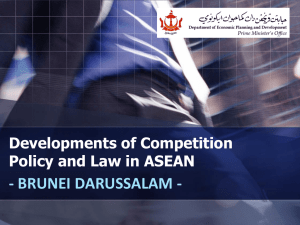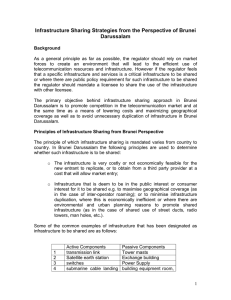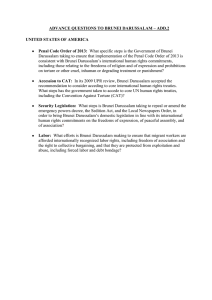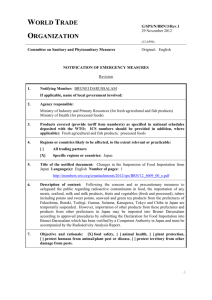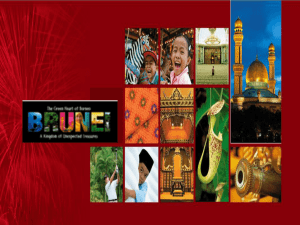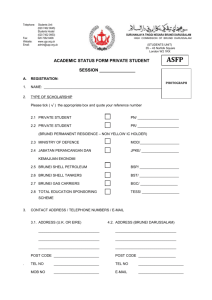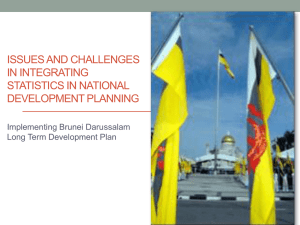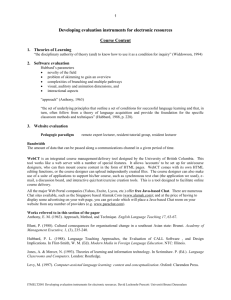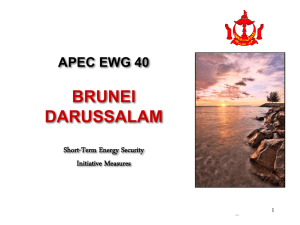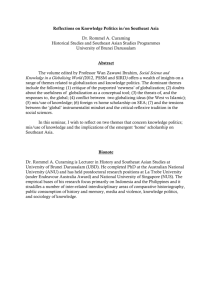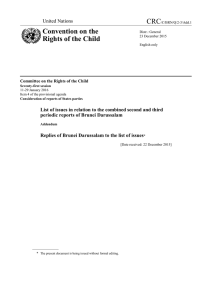Annex 09 - Brunei presentation
advertisement
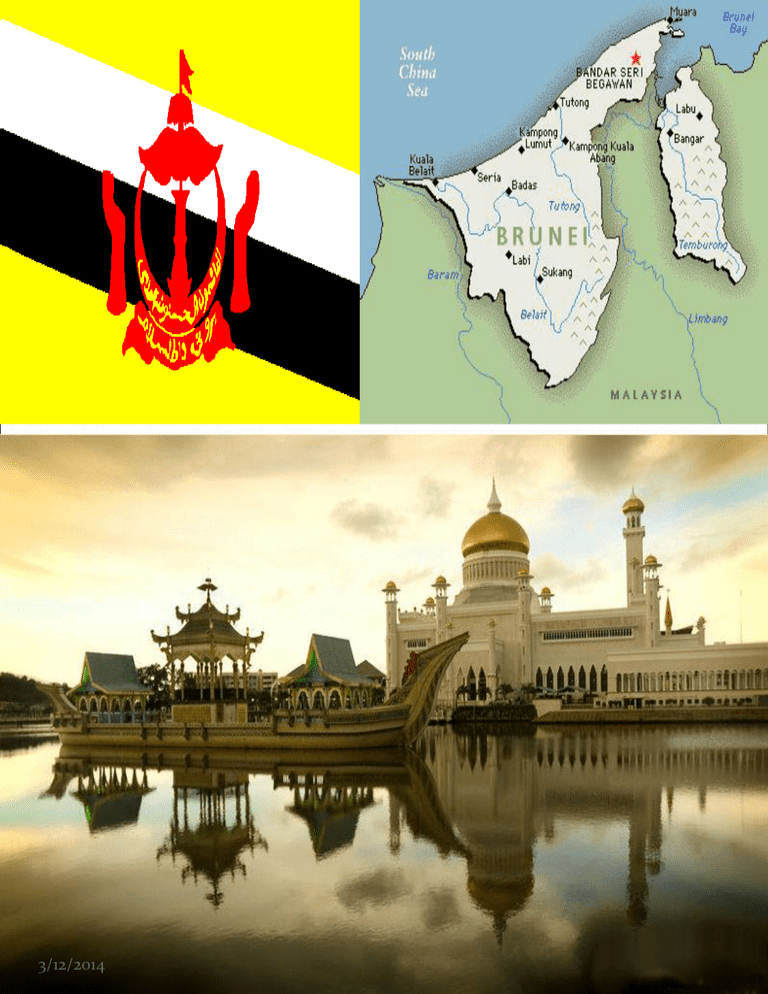
3/12/2014 BRUNEI DARUSSALAM’S COUNTRY REPORT ASEAN REGIONAL CONFERENCE OF SENIOR OFFICIALS ON SHARING OF GOOD PRACTICES IN SOCIAL PROTECTION FOR WOMEN IN ENTERPRISE DEVELOPMENT 3/12/2014 DEMOGRAPHY Strategically located on the north-west coast of Borneo, Right in the heart of Asia, Total land area of 5,765 km², Enjoys an equatorial climate with an average temperature of about 28° Celsius, High humidity and heavy rainfall. 3/12/2014 POPULATION The population estimate of Brunei Darussalam for 2011 is 422,700. Male 223,300 (53%) Female (199,400 (47%) Brunei citizen (65%) Permanent resident (8%) Temporary Residents (27%) 63% of the population in the working age group between the ages of 20 to 64 years. Only 3.5% of the population are above the age of 65. 3/12/2014 BRUNEI DARUSSALAM IN BRIEF • Small country with great potential • Per capita Income USD 26,400 (2009) • Absence of extreme poverty • Ambitious goals of zero poverty Intends to enhance the nation’s skill and human resource base • Develop more responsive and diversified economy • Women have equal access to education • Women play a significant role in country’s social and economic development • Low rate of infant, child and maternal mortality and control of communicable diseases 3/12/2014 SOCIAL PROTECTION Brunei Darussalam has taken wide variety of steps to ensure social protection for all of its citizens and residents. The policies and programs are designed to reduce poverty; upgrade the standard of living; ensuring the welfare and well beings of the residents: i. ii. iii. iv. v. 3/12/2014 education system; housing provision; health system; retirement packages and pensions for the aged and disabled population; Provides various allowances and subsidies to the entire population. SOCIAL PROTECTION Education is provided free to all citizens from primary to tertiary level from urban to rural areas. Hostels are provided for children from poor families. Free medical and health care services is also provided with minimal charges for registration only. subsidize the price of certain consumer goods such as rice and sugar. subsidized housing under our National Housing Scheme and Housing Scheme for Landless Citizens and interest free housing loans to government servants. 3/12/2014 RETIREMENT PACKAGES AND PENSIONS Increased the retirement age from 55 years to 60 years old to ensure that the people has an income to support themselves. Introduced the Employee Trust Fund (TAP scheme) which took effect on 1st January 1993; to ensure all TAP employees, who fulfill the set conditions, receive a monthly minimum income payment (annuity). In 2010, Brunei introduced the Supplemental Contributory Pension (SCP) scheme as an addition to TAP scheme. 3/12/2014 OLD AGE AND DISABILITY PENSIONS Brunei citizens and permanent residents who have reached the age of 60 years old and above are eligible for an Old Age Pension regardless of gender, economic and social status; Disability allowances are also provided to the disabled who have reached the age of 15 years. a non-contributory and non-means tested benefit. 3/12/2014 WELFARE ASSISTANCE Monthly welfare benefits or financial assistance are given to needy families of target groups comprising of widows, divorcees, orphans, bedridden people, and other targets groups in crisis. The welfare benefits given by the Community Development Department come in the form of subsistence allowance and education allowance. Mean tested. The Islamic Religious Council of Brunei Darussalam disburses tithe’ collections to deserving groups; For example, three groups are dominant namely the hard core poor, the poor, and the ‘Al-Gharimin’ (the group of Muslims who carry the burden of debts in order to meet basic necessities such as shelter and food in accordance with ‘Syaria’ law). 3/12/2014 SOCIAL PROTECTION FOR WOMEN IN SME Women have equal access to the provision of incentives and entrepreneurial support which include financial assistance schemes, access to infocommunication technology, business counselling as well as training in the form of workshops, seminars and consultations. The National Long-Term Development Plan 2035 also emphasize the need to set up a special fund for women in business. Existing program for women in SME includes; 1. 2. 3. 4. 5. 3/12/2014 Self-Reliance Scheme- by DCD Empowerment Program – by DCD Community Empowerment Program- by MCYS PROPAZ Program- source fund by tithe collections (MORA) BEDB Youth Development Resources Grant Scheme- ALCOA Foundation 1. SELF-RELIANCE SCHEME a micro-financing scheme introduced by Department of Community Development (DCD) to its welfare recipients in June 2006. provides seed capital to initiate or expand smallscale businesses with the exemption of interests, administrative charges, guarantor requirements and collateral. each recipient entitled for a sufficient amount of loan which can be repaid at a minimal amount, usually after a grace period of 3 months. periodic monitoring and consultation, training and development in business and entrepreneurship foundations including in financial management and marketing, motivational seminars and mentoring among others 3/12/2014 Target Groups: consists of poor and needy people with limited income; the unemployed and those with limited income- generating skills as well as entrepreneurial willpower. Since June 2006 up to 2014, the Self-Reliance Scheme have approved 106 applications for various business categories including food and catering, agriculture, fisheries, tailoring and grocery shops. Out of the total number of participants, 67.0 per cent are women. 3/12/2014 2. EMPOWERMENT PROGRAM In January of 2011, the Self-Reliance Scheme was upgraded to the Empowerment Programme (Program Perkasa). This programme features four main thrusts, namely Entrepreneurship Training, Business Skills Development, Self Development and Micro-Credit Financing. The four thrusts complement each other towards the achievement of the following objectives: To reduce dependency on Government welfare and support; To give additional exposure on entrepreneurship and business management; To encourage the traits of self-sustainable, selfresilience and competitive among the target group; and eventually To reduce the rate of poverty in Brunei Darussalam. 3/12/2014 The programme is hoped to achieve greater success than the Self-Reliance Scheme as the micro-credit financing is only disbursed to participants once they have undergone mandatory entrepreneurship training, business skills development as well as the self-development. 3/12/2014 3. COMMUNITY EMPOWERMENT PROGRAM Apart from that, in August 2013, MCYS operates a Community Empowerment Programme (Program Perkasa Komuniti) for the disadvantage people in which majority of participants are women. 3 months capacity building program; includes basic entrepreneurship training; business skills training; self-development program; Since 2013, 80 participants have joined this program; 75 female; 5 male.14 participants about to receive micro grant of $2,000.00 from the Ministry of Culture Youth and Sports. 3/12/2014 4. EMPOWERMENT PROGRAM FOR ZAKAT RECIPIENTS (PROPAZ) The Ministry of Religious Afffairs has initiated a programme called Program Pengupayaan Asnaf Zakat (PROPAZ) or Empowerment Programme for Zakat Recipients. This programme seeks to promote the skills and abilities of Zakat receivers through guidance and training at the Youth Development Centre (YDC) for a period of 3 months. 3/12/2014 BEDB YOUTH DEVELOPMENT RESOURCES (YDR) GRANT SCHEME YDR Scheme offers grant to youths who aspire to be future entrepreneurs. Grants will be supplied in the form of purchasing fixture and fittings. An interval monitoring will be done by the relevant authority. The cost of grant will be of BD$2,000 for each and participating entrepreneur. BEDB Micro Grants Recipients by Gender 3/12/2014 GAPS AND CHALLENGES 1. Stability of the businesses which needed to be maintained; To discipline their financial management 2. Commitments of young and single mother; Some young and single mother reluctant to participating in the course/ programs due to their commitments and responsibilities in looking after their children. 3/12/2014 LESSON LEARNED Continuous improvement For instance by providing the suitable programs & skills in line with the trend and market 3/12/2014 3/12/2014
